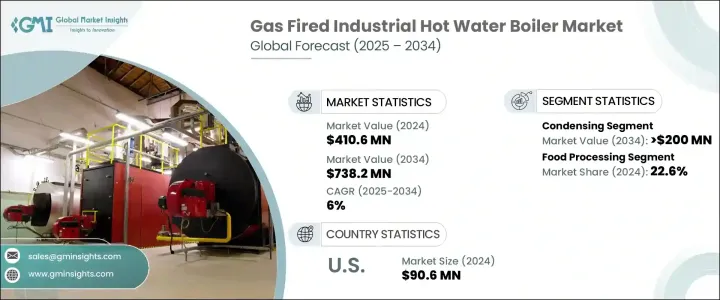
세계의 가스 연소 산업용 온수 보일러 시장 규모는 2024년 4억 1,060만 달러로 평가되었고, CAGR 6%로 성장할 전망이며, 2034년에는 7억 3,820만 달러에 달할 것으로 예측되고 있습니다. 세계의 산업 시설이 진화하는 규제 기준을 충족하기 위해 지속가능하고 에너지 효율적인 난방 기술로 시프트하고 있으며, 시장은 꾸준히 확대되고 있습니다. 온실 효과 가스의 배출 삭감과 에너지 이용의 개선을 의무화하는 환경 규제의 강화가, 다양한 분야에서 가스 연소 온수 보일러의 채용을 촉진하고 있습니다. 산업 사업자는 고성능을 유지하면서 이산화탄소 배출량을 줄이는 시스템을 우선시하고 있기 때문에 기술적으로 고도의 보일러 솔루션에 대한 일관된 수요가 생겨나고 있습니다. 식품 가공, 지역 난방, 섬유 제조 등의 산업이 운영 비용 삭감 및 효율성의 향상을 목표로 하는 가운데, 최신의 온수 보일러는 그 인프라에 불가결한 구성 요소가 되고 있습니다.

시장 성장은 예지 보전, 실시간 모니터링 및 운영 자동화 강화와 같은 스마트 기술의 통합을 통해 더욱 가속화됩니다. 이러한 기능은 시스템의 신뢰성을 높일 뿐만 아니라 다운타임과 에너지 낭비를 줄이고 기업이 대폭적인 비용 절감을 달성하는 데 도움이 되고 있습니다. 제조사들이 탈탄소화로의 세계적인 전환에 맞춰 설계된 에너지 효율적인 시스템을 도입함에 따라 끊임없는 기술 혁신이 상황을 바꾸고 있습니다. 콘덴싱 기술은 배기가스에서 잠열을 회수하고 열효율을 높여 연료 소비를 줄이는 능력으로 빠르게 보급되고 있습니다. 이 기술은 비용 대비 효과가 높고 컴플라이언스에 적합한 난방 솔루션을 원하는 바이어에게 중요한 세일즈 포인트가 되고 있습니다.
| 시장 범위 | |
|---|---|
| 시작 연도 | 2024년 |
| 예측 연도 | 2025-2034년 |
| 시작 금액 | 4억 1,060만 달러 |
| 예측 금액 | 7억 3,820만 달러 |
| CAGR | 6% |
시장은 기술별로 응축 보일러와 비응축 보일러로 구분됩니다. 컨덴싱 보일러는 최적 성능과 그린 기준에 준거를 목표로 하는 산업에서의 채용 증가를 반영하여 2034년까지 2억 달러를 창출할 것으로 예측되고 있습니다. 이러한 시스템은 열 회수를 개선하고 전체적인 에너지 경비를 절감함으로써 가시적인 이점을 제공하고 제조업체에 매력적인 투자가 됩니다.
이 분야의 기업은 엄격한 배출 규제를 충족하고 공정 효율성을 향상시키기 위해 레거시 시스템 업그레이드를 점점 더 추진하고 있습니다. 이 분야의 지속적인 근대화 노력은 세계 선진 보일러 도입의 큰 원동력이 되고 있습니다.
미국의 가스 연소 산업용 온수 보일러 시장의 2022년 시장 규모는 7,990만 달러로 평가되었고, 2034년에는 1억 5,000만 달러에 이를 것으로 예측됩니다. 미국 산업계 전체에서 디지털 전환에 대한 대처가 급증하고 있으며, 스마트한 고효율 보일러의 도입이 가속화되고 있습니다. 이러한 시스템은 자동 진단, 예지 보전, 최적화된 열 관리를 지원하는 기능을 갖추고 있어 탁월한 운영과 비용 절감에 기여합니다.
세계 시장의 주요 기업으로는 Bosch Industriekessel, Cleaver-Brooks, Viessmann, Johnston Boiler, Hurst Boiler &Welding, Babcock Wanson, Cochran, Thermodyne Boilers, Fulton, Hoval, Thermon, Ecotherm AustriaMi Boiler, Indeck Power Equipment, HKB 등이 있습니다. 이러한 기업은 원격 감시, 실시간 분석, 성능 향상 기능을 갖춘 고급 제품을 출시하기 위해 연구 개발에 많은 투자를 실시했습니다.
The Global Gas Fired Industrial Hot Water Boiler Market was valued at USD 410.6 million in 2024 and is estimated to grow at a CAGR of 6% to reach USD 738.2 million by 2034. The market is witnessing steady expansion as industrial facilities worldwide shift toward sustainable, energy-efficient heating technologies to meet evolving regulatory standards. Stricter environmental mandates requiring the reduction of greenhouse gas emissions and improved energy usage are driving the adoption of gas-fired hot water boilers across diverse sectors. Industrial operators are prioritizing systems that reduce carbon footprints while maintaining high performance, thereby creating consistent demand for technologically advanced boiler solutions. As industries such as food processing, district heating, and textile manufacturing aim to cut operating costs and boost efficiency, modern hot water boilers have become essential components in their infrastructure.

Market growth is further fueled by the integration of smart technologies like predictive maintenance, real-time monitoring, and enhanced operational automation. These features not only increase system reliability but also reduce downtime and energy waste, helping companies achieve significant cost savings. Continuous innovation is reshaping the landscape as manufacturers introduce energy-efficient systems designed to align with the global shift toward decarbonization. Condensing technology is rapidly gaining popularity due to its ability to recover latent heat from exhaust gases, increasing thermal efficiency and reducing fuel consumption. This technology is becoming a key selling point for buyers seeking cost-effective and compliant heating solutions.
| Market Scope | |
|---|---|
| Start Year | 2024 |
| Forecast Year | 2025-2034 |
| Start Value | $410.6 Million |
| Forecast Value | $738.2 Million |
| CAGR | 6% |
The market is segmented by technology into condensing and non-condensing boilers. Condensing boilers are projected to generate USD 200 million by 2034, reflecting their rising adoption across industries aiming for optimal performance and compliance with green standards. These systems offer a tangible advantage by improving heat recovery and lowering overall energy expenses, making them an attractive investment for manufacturers.
The chemical sector plays a critical role in supporting market growth, as companies in this space are increasingly upgrading legacy systems to meet stringent emission regulations and improve process efficiency. This sector's ongoing modernization efforts are a significant driver of advanced boiler deployments worldwide.
The U.S. Gas Fired Industrial Hot Water Boiler Market was valued at USD 79.9 million in 2022 and is forecast to reach USD 150 million by 2034. A surge in digital transformation efforts across U.S. industries is accelerating the adoption of smart, high-efficiency boilers. These systems are equipped with features that support automated diagnostics, predictive maintenance, and optimized heat management-factors that contribute to operational excellence and cost reduction.
Major players in the global market include Bosch Industriekessel, Cleaver-Brooks, Viessmann, Johnston Boiler, Hurst Boiler & Welding, Babcock Wanson, Cochran, Thermodyne Boilers, Fulton, Hoval, Thermon, Ecotherm Austria, Miura America, Danstoker, California Boiler, Indeck Power Equipment, and HKB. These companies are investing heavily in R&D to launch advanced products with remote monitoring, real-time analytics, and enhanced performance capabilities. Strategic mergers and acquisitions remain central to expanding their product lines and tapping into emerging markets.